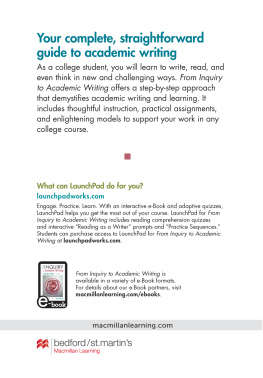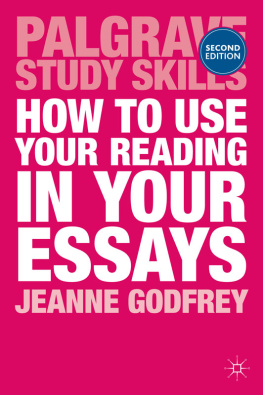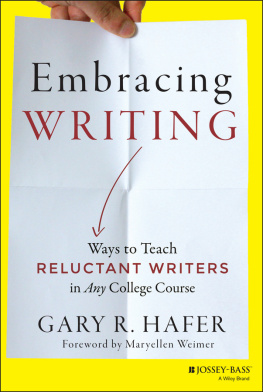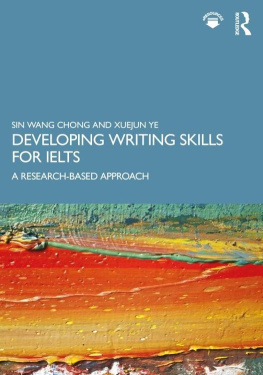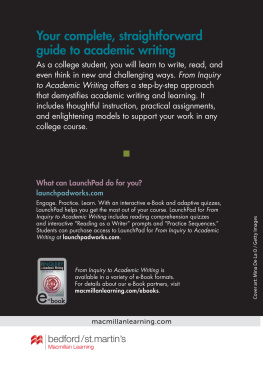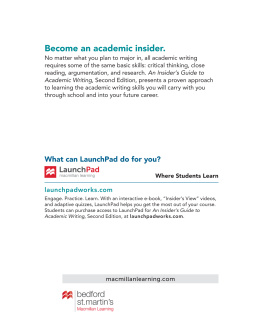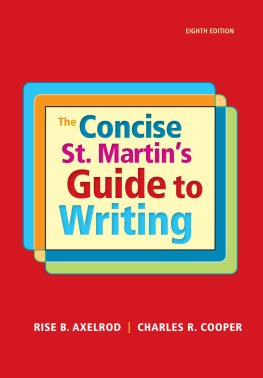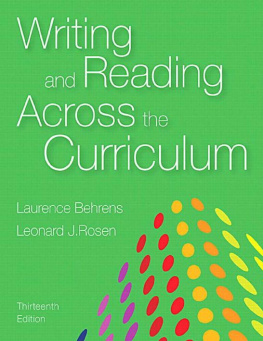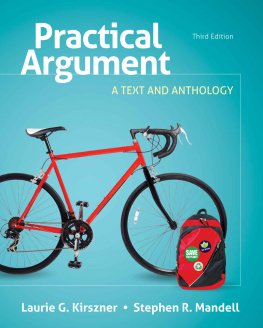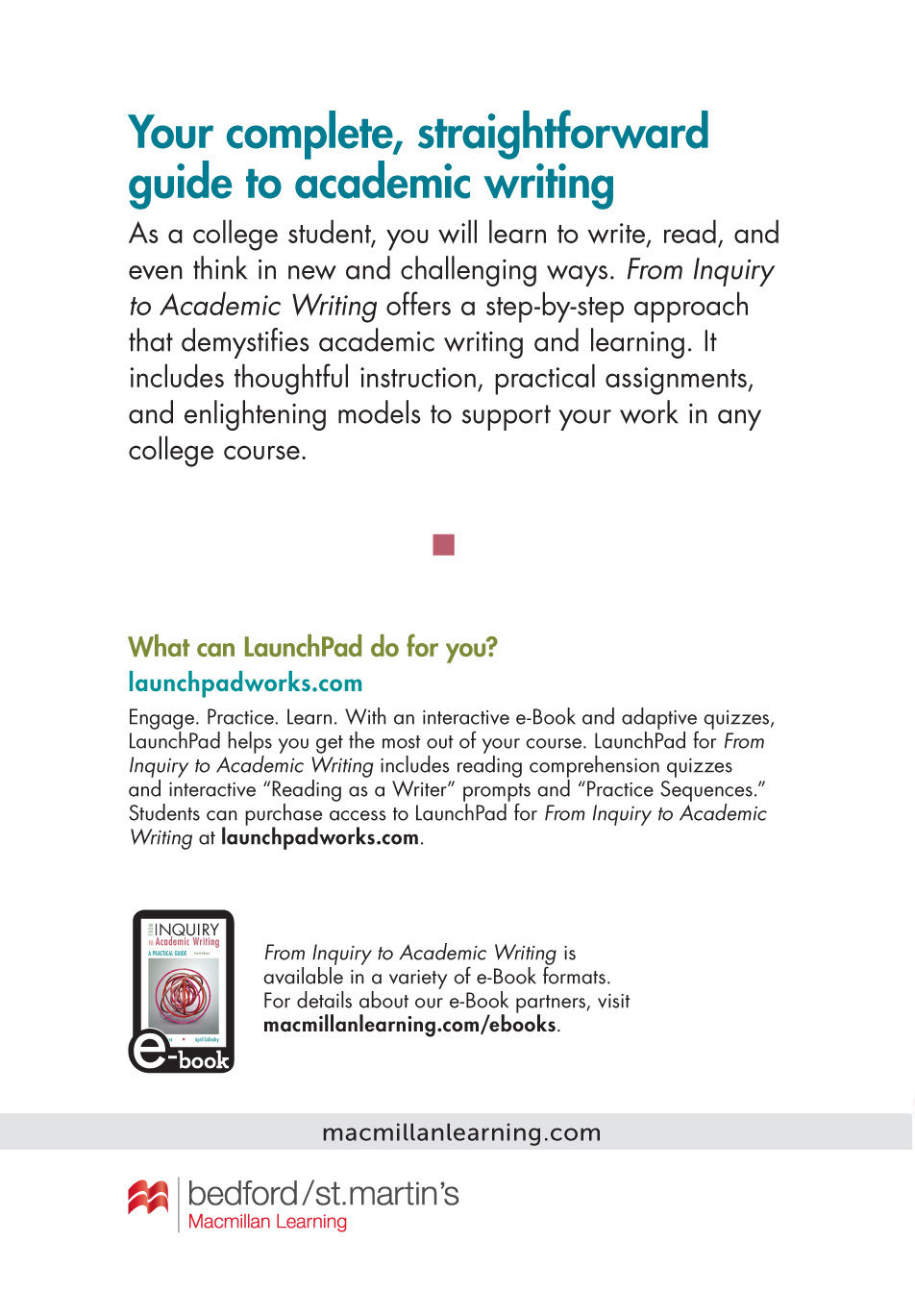
Text on the back cover page reads, Your complete, straightforward guide to academic writing:
As a college student, you will learn to write, read, and even think in new and challenging ways. From Inquiry to Academic Writing offers a step-by-step approach that demystifies academic writing and learning. It includes thoughtful instruction, practical assignments, and enlightening models to support your work in any college course.
What can LaunchPad do for you? launchpadworks.com. Engage. Practice. Learn. With an interactive e-Book and adaptive quizzes, LaunchPad helps you get the most out of your course. LaunchPad for From Inquiry to Academic Writing includes reading comprehension quizzes and interactive Reading as a Writer prompts and Practice Sequences. Students can purchase access to LaunchPad for From Inquiry to Academic Writing at launchpadworks.com. From Inquiry to Academic Writing is available in a variety of e-Book formats. For details about our e-Book partners, visit macmillanlearning.com/ebooks. An e-reader is shown displaying the front cover.
macmillanlearning.com
Macmillan logo is shown, followed by text Bedford st.martins Macmillan Learning. At the bottom right corner of the cover, a bar code is shown. ISBN 978-1-4576-9206-2 and the number 90000 is shown above the bar code. The number 97814576692062 is shown below the bar code.

Text on the page reads, Steps to Academic Writing: A Quick Reference Guide
Thinking
Inquiry, p. 6. Seeking and Valuing Complexity, p. 8. Joining an Academic Conversation, p. 11.
Reading
Analyzing a Text Rhetorically, p. 48. Identifying Claims, p. 95. Analyze the Reasons Used to Support a Claim, p. 96. Analyzing an Argument, p. 104. Identifying Issues, p. 122. Formulating an Issue-Based Question, p. 130. Visual Analysis, p. 293.
Research
Collecting Information and Material, p. 13. Identifying Sources, p. 172. Searching for Sources, p. 177 Evaluating Library Sources, p. 180. Evaluating Internet Sources, p. 183. Writing an Annotated Bibliography, p. 185. Writing a Proposal, p. 382. Interviewing, p. 394. Conducting a Focus Group, p. 400
Working with Sources.
Writing a Paraphrase, p. 69. Writing a Summary, p. 77. Writing a Synthesis, p. 217. Avoiding Plagiarism, p. 229. Integrating Quotations into Your Writing, p. 234. Using Visuals in Writing an Argument, p. 310. Compiling an MLA List of Works Cited, p. 802. Compiling an APA List of References, p. 806
Writing
Drafting, p. 14. Revising, p. 15. Reflection, p. 17. Writing Yourself into an Academic Conversation, p. 79
Formulating a Working Thesis: Four Models, p. 146. Establishing a Context for a Thesis, p. 153. Appealing to Ethos, p. 257. Appealing to Pathos, p. 260. Appealing to Logos, p. 267. Drafting Introductions: Five Strategies, p. 320. Developing Paragraphs, p. 333. Drafting Conclusions: Five Strategies, p. 339. The Peer Editing Process, p. 346
Steps to Academic Writing: A Quick Reference Guide
Thinking
Inquiry,
Seeking and Valuing Complexity,
Joining an Academic Conversation,
Reading
Analyzing a Text Rhetorically,
Identifying Claims,
Analyze the Reasons Used to Support a Claim,
Analyzing an Argument,
Identifying Issues,
Formulating an Issue-Based Question,
Visual Analysis,
Research
Collecting Information and Material,
Identifying Sources,
Searching for Sources,
Evaluating Library Sources,
Evaluating Internet Sources,
Writing an Annotated Bibliography,
Writing a Proposal,
Interviewing,
Conducting a Focus Group,
Working with Sources
Writing a Paraphrase,
Writing a Summary,
Writing a Synthesis,
Avoiding Plagiarism,
Integrating Quotations into Your Writing,
Using Visuals in Writing an Argument,
Compiling an MLA List of Works Cited,
Compiling an APA List of References,
Writing
Drafting,
Revising,
Reflection,
Writing Yourself into an Academic Conversation,
Formulating a Working Thesis: Four Models,
Establishing a Context for a Thesis,
Appealing to Ethos,
Appealing to Pathos,
Appealing to Logos,
Drafting Introductions: Five Strategies,
Developing Paragraphs,
Drafting Conclusions: Five Strategies,
The Peer Editing Process,
A note about the cover: Academic writing is a recursive process. As you write, you circle back to rethink your assumptions, expand your understanding, and add support to your ideas. The artwork on the cover of From Inquiry to Academic Writing reflects the looping nature of this process.
ACKNOWLEDGMENTS
Emily Badger. Mapped: The Places Where Most Public School Children Are Poor. From the Washington Post, Wonkblog, May 13, 2015, https://www.washingtonpost.com/news/wonk/wp/2015/05/13/mapped-the-places-where-most-public-school-children-are-poor/?utm_term=.36097011ca12. Copyright 2016 The Washington Post. All rights reserved. Used by permission and protected by the Copyright Laws of the United States. The printing, copying, redistribution, or retransmission of this Content without express written permission is prohibited.
Susan D. Blum. The United States of (Non)Reading: The End of Civilization or a New Era? From HuffPost College, October 8, 2013. Copyright 2013 by Susan Blum. Reprinted with permission.
Ta-Nehisi Coates. Between the World and Me. From Between the World and Me by Ta-Nehisi Coates. Copyright 2015 by Ta-Nehisi Coates. Used by permission of Spiegel & Grau, an imprint of Random House, a division of Penguin Random House LLC. All rights reserved. Any third party use of this material, outside of this publication, is prohibited. Interested third parties must apply directly to Penguin Random House LLC for permission.
Anne Colby and Thomas Ehrlich, with Elizabeth Beaumont and Jason Stephens (the Carnegie Foundation for the Advancement of Teaching). Excerpt from Undergraduate Education and the Development of Moral and Civic Responsibility. From The Communitarian Network, www2.gwu.edu/~ccps/Colby.html. Reprinted by permission of the Institute for Communitarian Policy Studies.
William Deresiewicz. The End of Solitude. From the Chronicle of Higher Education, January 2009. Used with the permission of the Chronicle of Higher Education. Copyright 2009. All rights reserved.
John Dickerson. Dont Fear Twitter. From Nieman Reports, Summer 2008. Nieman Foundation for Journalism at Harvard. Reprinted by permission.
Barbara Ehrenreich. Cultural Baggage. From the New York Times Magazine, April 5, 1992. Copyright 1992 by Barbara Ehrenreich. Used by permission. All rights reserved.
Gerald Graff. Hidden Meaning, or Disliking Books at an Early Age [Disliking Books]. From Beyond the Culture Wars: How Teaching the Conflicts Can Revitalize American Education by Gerald Graff. Copyright 1992 by Gerald Graff. Used by permission of W. W. Norton & Company, Inc.
Steve Grove. YouTube: The Flattening of Politics. From Nieman Reports, Summer 2008. Nieman Foundation for Journalism at Harvard. Reprinted by permission.
Kris Gutirrez. Excerpt from Teaching Toward Possibility: Building Cultural Supports for Robust Learning. From
Next page
